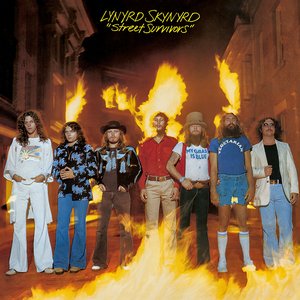Published on Oct 31, 1997
On October 20, 1977, the face of rock and roll was changed
forever when Lynyrd Skynyrd’s charter plane crashed en route to a
concert, killing lead vocalist Ronnie Van Zant, guitarist/vocalist
Steve Gaines and backup singer Cassie Gaines.
Lost in the overhype of the tragic anniversary this year is the
fact that the album they released just days before the crash,
Street Survivors, was easily the band’s best work. (I would
have featured the album’s original cover, but I could not find a
suitable scan; the cover you see above was the replacement that MCA
rushed onto the market just after the crash.)
In 1977, Lynyrd Skynyrd was enjoying a rejuvenation of sorts.
Van Zant had cleaned up his act after the birth of his daughter,
guitarist Gary Rossington was in the process of straightening up
his life following a car crash the previous year, and Steve Gaines,
who had just joined the band (replacing original guitarist Ed
King), was providing a creative spark the band had been missing on
their last studio outing,
Gimme Back My Bullets. While Lynyrd Skynyrd would always be
Van Zant’s baby, he graciously allowed Gaines the freedom to kick
in his own influences – and even take over lead vocals on
occasion.
This turned out to be an excellent decision for the band.
Gaines’ two songs (and two co-writing contributions) were the kick
in the ass that began shifting Lynyrd Skynyrd from a Southern
boogie band to a group that could be appreciated at all levels by
all sorts of fans. In this manner,
Street Survivors succeeds on all levels.
Most everyone knows the song “What’s Your Name” off this album,
as it has been beaten to death by classic rock stations. It still
is a very enjoyable track, both for the humorous look at groupies
and the renewed triple-guitar attack of Gaines, Rossington and the
late Allen Collins. I don’t remember their playing ever to be this
fluid and crisp – incredible!
“That Smell,” another song latched onto by rock radio, is still
one of the most powerful substance-abuse songs I’ve ever heard. A
song that took its basis from Rossington’s 1976 car crash (“Oak
tree, you’re in my way”), it was the newly clean-and-sober Van
Zant’s wake-up call to Rossington. (When you hear Van Zant say in
the background of one of the guitar solos, “You know I’ve been
there before,” you know that this message is sincere.)
Possibly one of the most surprising and most beautiful moments
on
Street Survivors is “One More Time,” a song which began to
break Lynyrd Skynyrd out of the boogie band classification.
Flowing, stacatto guitar lines, impressive trap work by drummer
Artimus Pyle and Van Zant sounding the best he ever had behind the
microphone make this one a forgotten classic in my book.
In the same vein, the Van Zant-Gaines collaboration “I Never
Dreamed” breaks the band out of the good-ol-boy mode, creating a
song which is both gentle and powerful at the right times. Van Zant
wisely delivers his vocal more softly than he might have normally,
and the track clicks.
Gaines’ influence is felt with the rollicking blues number “I
Know A Little,” which not only shows off some fancy guitar work
(and what sounds like a dobro lead to me) but also the bass work of
Leon Wilkerson, which often took a backseat to both guitar lines
and Billy Powell’s piano. Wilkerson shows how good he is on the
bass here. Gaines also shows off his pipes by trading vocals with
Van Zant on “You Got That Right” and taking over the microphone on
“Ain’t No Good Life,” featuring Powell on roadhouse piano (a little
out of tune, but that just added to the track). The only cover,
that of Merle Haggard’s “Honky Tonk Night-Time Man,” is the only
weak link on the album – and even that’s a halfway decent track due
to the fancy guitar work.
When you realize the revitalization that Lynyrd Skynyrd was
going through in 1977, it makes the plane crash all the more
tragic. This was a band that was at the top of their career when
the unthinkable happened; one is left to wonder what new plateaus
they would have reached had they been given the chance to follow
Street Survivors up. (The surviving members finally reunited
in 1980 as the Rossington-Collins Band. Collins later formed his
own band which recorded one album in 1983; he was paralyzed in a
car crash in 1986 and died four years later.)
I don’t want to knock the present-day incarnation of Lynyrd
Skynyrd, but
Street Survivors is a high I don’t think they will ever be
able to reach again. This is one album that is a must-own for music
fans of all styles and ages.
